AIMing High Washington and Lee University’s Advanced Immersion and Mentoring (AIM) Scholars Summer Program offers a residential and virtual format to meet students’ needs.
“For many students, there is a huge gap between high school life and college life. The AIM program helps close that gap and make the college experience more comfortable, understandable and accessible.”
~Sybil Prince Nelson, assistant professor of mathematics
Washington and Lee University’s Advanced Immersion and Mentoring (AIM) Scholars Summer Program has evolved throughout its time on campus, particularly during the COVID-19 pandemic. For the last two summers, the program has only been offered in a virtual format. This summer, W&L offered program participants the flexibility of a virtual option in addition to its typical residential format.
AIM’s 2022 session was divided into two cohorts. The first group of students completed research on campus for five weeks from June 12 to July 16. The second group participated in a condensed virtual version of the program from July 18 to July 22. Director of Leadership Development and Student Engagement Leah Beard, who coordinates the AIM program, said that this year’s hybrid approach to programming was intentional and designed to benefit students who may be unable to be on campus for the five-week residential program.
“The itineraries for both cohorts were designed to help students develop a sense of familiarity with the campus, faculty and staff partners,” Beard said. The residential cohort included 21 scholars and 13 scholars participating in the virtual program.
AIM began in 2016 as the Advanced Research Cohort (ARC), a pilot initiative aimed at expanding diversity among science, technology, engineering and math-related (STEM) majors at W&L. The program paired incoming students with peer and faculty mentors for five weeks as students assisted a professor with summer research. The university made expanding the ARC program a key element of its 10-year Quality Enhancement Plan in 2018. Two years later, student participation in the program had more than doubled.
All of the AIM scholars will arrive on campus for pre-orientation in August, with the virtual group scheduled for two full days of AIM programming prior to departing on their respective Leading Edge trips. Much of the two-day programming will be similar to presentations and networking events that residential AIM scholars attended in the summer. Beard credits the program’s success to the support it has received from departments across campus.
“AIM wouldn’t exist without the support of our faculty partners,” Beard said. “One of the fundamental pieces of the program is the academic immersion in meaningful, impactful research. The same goes for our staff partners. Without them, we wouldn’t be able to host the personal and professional development programs that allow the scholars to get to know the campus resources available to them.”
Sybil Prince Nelson, assistant professor of mathematics, said she has been pleased to see the interaction between Summer Research Scholars (SRS) and AIM scholar Darby Burgett in her research group. Their summer project investigated the relationship between Benford’s Law – a phenomenon that appears in many naturally occurring data sets – and music, building on Nelson’s prior research.
“I have two SRS students, a senior and a sophomore, who are also working with me in the lab this summer. They really hit it off with Darby and made her feel comfortable and accepted as a new W&L student,” Nelson said. “Even after the AIM residential program ended, all of us are still meeting over Zoom to keep in touch and talk about our research.”
Burgett said that working with Nelson was appealing to her because of Burgett’s background as a musician and interest in mathematics. She credits the AIM experience with making her feel more ready for the challenges and opportunities that await her in the fall.
“I think AIM has made me more excited to start college,” Darby said. “At the beginning of the summer, I was unsure because I’m not the hugest fan of change. After AIM, I’m more excited because I know what’s waiting for me and it all seems exciting.”
“I think the AIM program is a great way to introduce college life to incoming first years,” Nelson said. “For many students, there is a huge gap between high school life and college life. The AIM program helps close that gap and make the college experience more comfortable, understandable and accessible.”
Donald Gaylord, research archaeologist and instructor of anthropology at W&L, jumped at the chance to get involved with the program’s expansion to include research experiences in the humanities. Gaylord is a first-generation college student who has volunteered his time mentoring students in the university’s First-Gen Low-Income Partnership (FLIP) program. Gaylord worked with students this summer doing archaeological excavation and research on campus at Liberty Hall, the location of the 18th-century site of W&L’s predecessor institution, Liberty Hall Academy.
“I think my favorite parts are when we’re in the field and looking for artifacts, whether it’s digging or using the flotation device,” said AIM participant Abby Kim ’26, who was one of Gaylord’s research assistants. “The collective spirit that comes with doing field work feels special. It feels like the entire team is working together to discover these fascinating pieces of history.”
Gaylord said his personal story now informs how he approaches his work with incoming students.
“Not a single person on either side of my family had, or has yet, graduated from college except for me,” Gaylord said. “I have always felt I got much less out of my college experience than I should have, because I had no idea about anything regarding college life. It wasn’t until I was in grad school that I began to understand how much more is possible in college if you just know where to look.”
Gaylord said that the most gratifying part of the work was helping students transition into such an exciting and eventful time in their lives.
“One of the things I have always cherished since back in undergrad and grad school, but especially now as a professor, is the unique feeling of excitement, hopefulness and unbounded opportunity that comes with each Fall Term when incoming first-year students bring their energy to campus,” Gaylord said.
For program advisor and former AIM student Ben Bankston ’25, bringing the energy of the residential program to the virtual week of programming was an exciting challenge. Bankston said that working with the team this summer has provided him with invaluable experience in program development and collaboration, and he looks forward to applying his summer experience to his role with the First-Year Orientation Committee this fall.
“I was given a great experience by my program advisors and everybody who participated in AIM last summer,” Bankston said, “so I loved having the chance to give that same opportunity to students who are coming in with this new class.”
Scholars participating in the virtual program attended student panels, faculty break-out sessions and team-building workshops. Virtual AIM scholars also held informal meetups before and during their AIM schedule, and program advisors from the residential and virtual programs are planning another virtual meetup for all AIM participants before classes start.
“I loved working with the program advisors because I was able to receive advice from students who were in my same shoes just last year,” said Ava Grace Flory, a virtual AIM participant. “I also enjoy knowing I now have an upperclassman on campus who I can reach out to with questions or ask for advice – the security of entering freshman year with a trustworthy contact feels great.”
“I think the broader AIM initiative brings faculty and staff together in a way that allows us to discuss the support systems and resources in a holistic way,” said Megan Hobbs, associate dean of students and co-director of the AIM initiative. “By doing this, I think we are only deepening our understanding of the roles we play in the lives of our students and strengthening partnerships, in turn making for a better student experience.”
John T. Perry Professor of Biology and Research Science Helen I’Anson, who co-directs the program alongside Hobbs, said that she hopes the combination of in-person and virtual formats will create space to accommodate even more incoming students.
“These students are more confident when they set foot on our campus in the fall,” I’Anson said. “They are also very aware of leadership opportunities that are open to them, and they are more willing to become involved in campus life.”
Beard said that she also hopes to see applications for the program grow in the coming years.
“I want incoming students to take a chance and apply for the AIM Scholars Program – step outside their comfort zone and go for it,” Beard said. “Taking part in this unique opportunity will jumpstart their experience at W&L.”
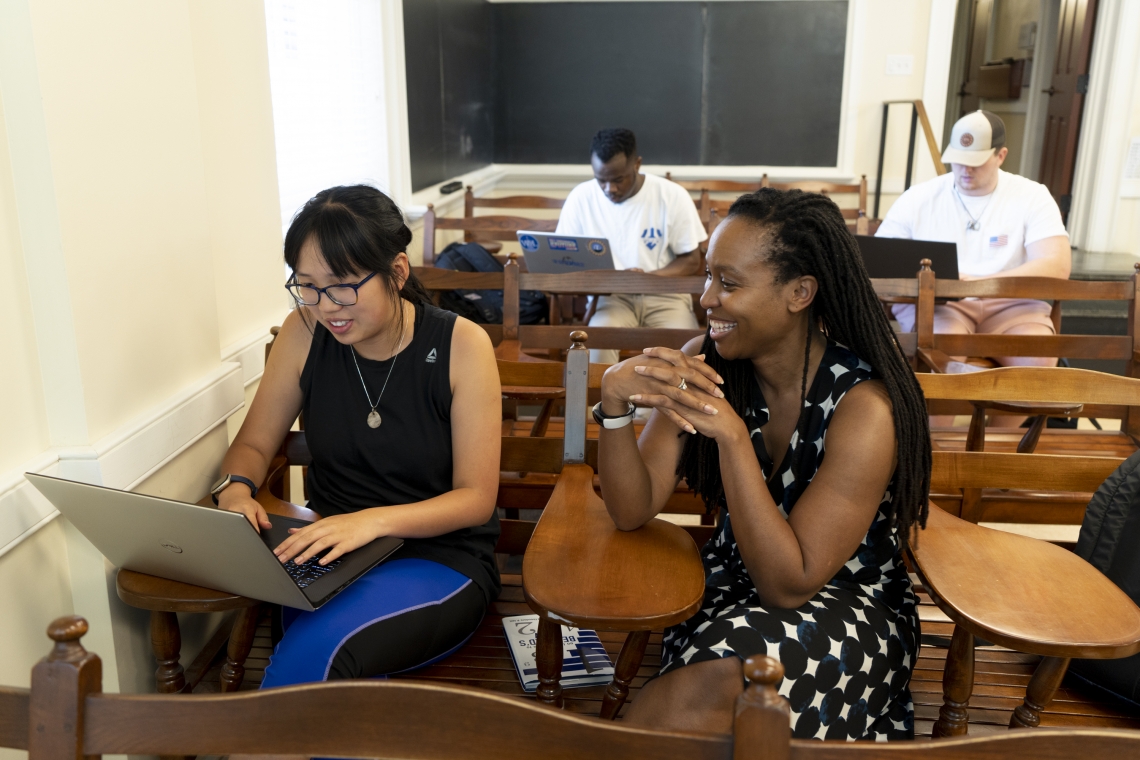 Sybil Prince Nelson and AIM Scholar Darby Burgett
Sybil Prince Nelson and AIM Scholar Darby Burgett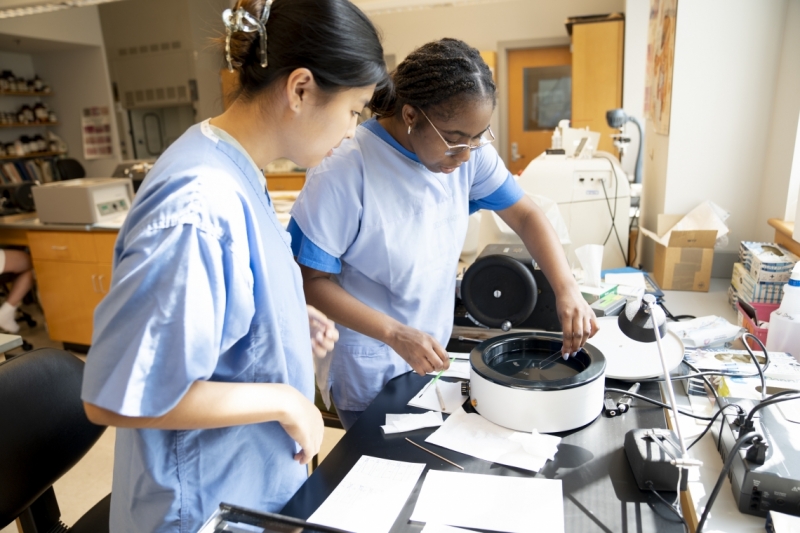 AIM program advisor Yewon Shin and AIM Scholar Autumn Crawford in the lab
AIM program advisor Yewon Shin and AIM Scholar Autumn Crawford in the lab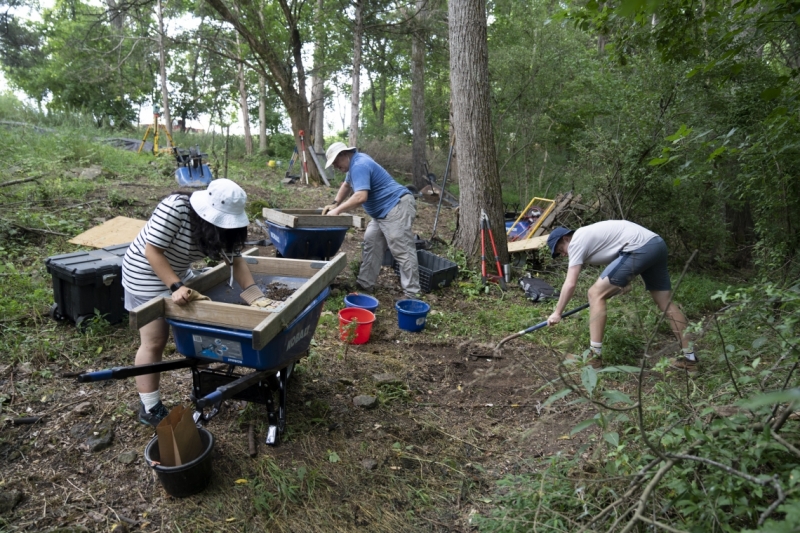 Donald Gaylord oversees students’ excavation.
Donald Gaylord oversees students’ excavation.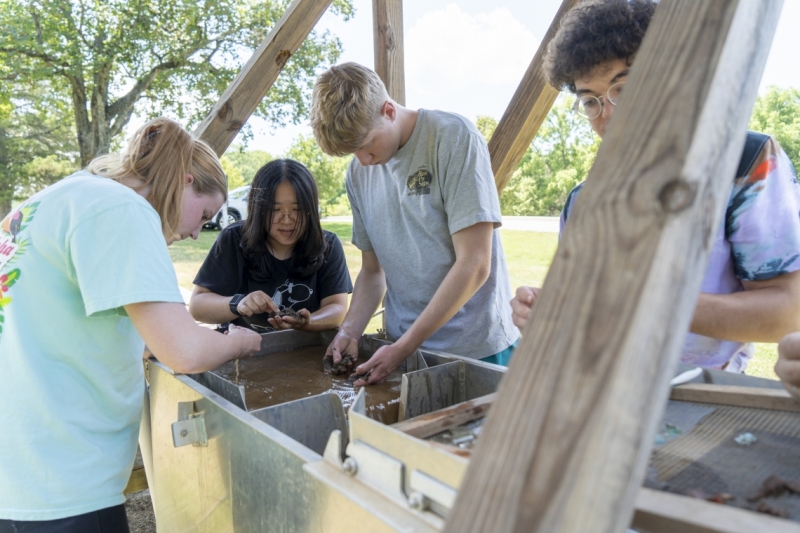 AIM Scholars examine artifacts found on back campus.
AIM Scholars examine artifacts found on back campus.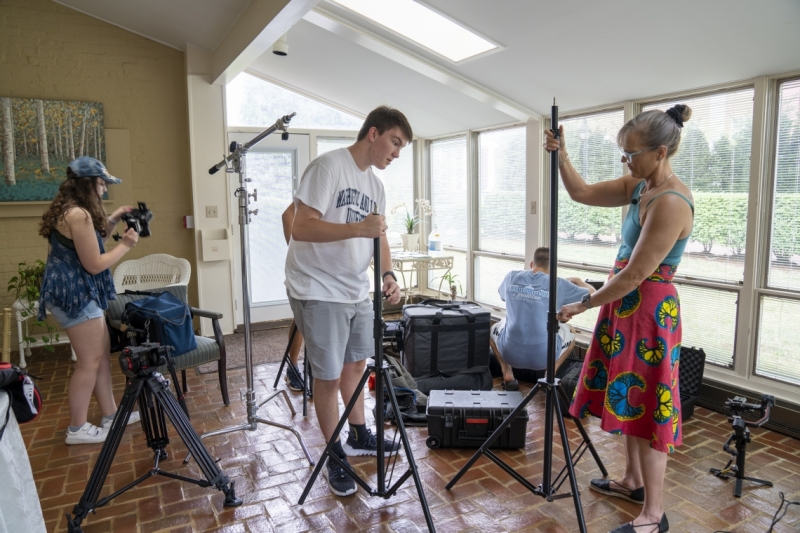 AIM Scholar Florian Sloan help Assistant Professor of Theater Stephanie Sandberg configure audio for a performance.
AIM Scholar Florian Sloan help Assistant Professor of Theater Stephanie Sandberg configure audio for a performance.
You must be logged in to post a comment.